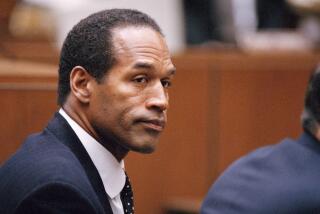Column: The awful echoes of the Trayvon Martin tragedy in the trial of the men who killed Ahmaud Arbery

As I watch the trial of three white men charged with murdering Ahmaud Arbery, a young Black man who was out for a jog in a coastal Georgia suburb when they descended on him with trucks and guns, I can’t help seeing parallels with the death of 17-year-old Trayvon Martin, who was killed in 2012 in Sanford, Fla., under similar circumstances.
Trayvon was set upon by George Zimmerman, then 28, a neighborhood watch captain who decided that Trayvon was up to no good.
In fact, Trayvon was on his way back from a convenience store to the home of his father’s fiancée. He was armed with Skittles and a drink, and he was on his phone.
Zimmerman called 911 to advise police of “a suspicious person” walking down the sidewalk. What made Trayvon suspicious?
The color of his skin?
That his hoodie was pulled up?
Zimmerman was told by the 911 operator to stay in his car to wait for police. Instead, he walked after Trayvon, who told his friend he was being followed. There was a physical altercation, and Zimmerman shot the teenager dead.
The local police chief did not file charges against Zimmerman, saying there was no way to disprove his claim of self-defense.
That decision attracted national outrage, including demonstrations such as the Million Hoodie March in New York City. The FBI and the Justice Department launched an investigation. President Obama weighed in, famously saying, “If I had a son, he’d look like Trayvon.”
After weeks of political pressure, Florida’s governor appointed a special prosecutor, who charged Zimmerman with second-degree murder.
In July 2013, a six-woman jury, five of whom were white, acquitted him.
::
I will never understand how a jury was unable to see that Zimmerman engineered the entire tragedy and was responsible for creating the situation that left Trayvon dead.
How is it that a man follows and intimidates a Black teenager, picks a fight, gets beaten up by the terrified kid, kills the youngster and is found to have been within his rights? How is it that a man creates the very circumstances under which he is allowed to kill in the name of self-defense?
Across the country, in Oakland, a Black woman named Alicia Garza was devastated by the Zimmerman verdict. She logged on to Facebook and wrote an impassioned post, concluding “Black people, I love you. Our lives matter.” Her friend Patrisse Cullors in Los Angeles turned the sentiment into a hashtag, #BlackLivesMatter. Their friend Opal Tometi helped them spread the word on social media.
Thus was born one of the most important and consequential social justice movements in the history of our nation.
“Black Lives Matter” became a rallying cry as a succession of depressingly familiar killings of unarmed Black people, documented on cellphone cameras and spread by social media, unfolded week after week, culminating for many in the despicable murder of George Floyd, which set off protests around the country and the world.
It is in this context — a heightened awareness of relentless racist violence, systemic racism and white privilege — that Gregory McMichael, his son Travis McMichael and their neighbor William “Roddie” Bryan Jr. are on trial in Glynn County, Ga.
The trio are charged with murdering Arbery, a former high school football player who was jogging through a neighborhood called Satilla Shores near the town of Brunswick. They claim they were acting in self-defense.
Arbery was seen poking around a neighbor’s home that was under construction. The defendants say they believed he was responsible for a string of recent burglaries in the neighborhood. Their defense attorneys have claimed they were making a citizen’s arrest, though the first officer at the scene testified that Bryan told him he’d never uttered those words to Arbery.
According to news reports , police said that there was a single report of a break-in in the weeks before the killing: Travis McMichael claimed a gun was stolen from his unlocked truck.
Ten weeks after Arbery was killed, a damning cellphone video surfaced, showing the last moments of the young man’s life. It appeared he was boxed in by a truck, then killed after trying to push away a shotgun that Travis McMichael had trained on him.
The video was shot by Bryan, who claimed to have simply been a bystander, but who prosecutors say joined in the chase and tried to “confine and detain” Arbery with his vehicle.
Had the video never become public, who knows whether charges would have ever been filed?
Already the trial has been tainted by the whiff of racism.
The jury consists of 11 white people and only one Black person. Prosecutors accused the defense of striking Black potential jurors based on their race — which is illegal — but the judge rejected the claim. And yet, the judge stated, “This court has found that there appears to be intentional discrimination.”
On Thursday, during a break in the trial, one of the defense attorneys objected to the presence in the courtroom of the Rev. Al Sharpton, who was invited by the Arbery family.
“We don’t want any more Black pastors coming in here,” said Kevin Gough, who displayed even more breathtaking cluelessness when he added, “If folks came in here dressed as Colonel Sanders with white masks sitting in the back, I mean…”
When I hear that sort of not-even-subtle racism, it makes me wonder just how much things in this country have changed since Trayvon Martin’s killer was acquitted.
Was the conviction of George Floyd’s killer only a fleeting moment in the history of the civil rights struggle?
We will have our answer when that mostly white Georgia jury weighs in.
More to Read
A cure for the common opinion
Get thought-provoking perspectives with our weekly newsletter.
You may occasionally receive promotional content from the Los Angeles Times.












